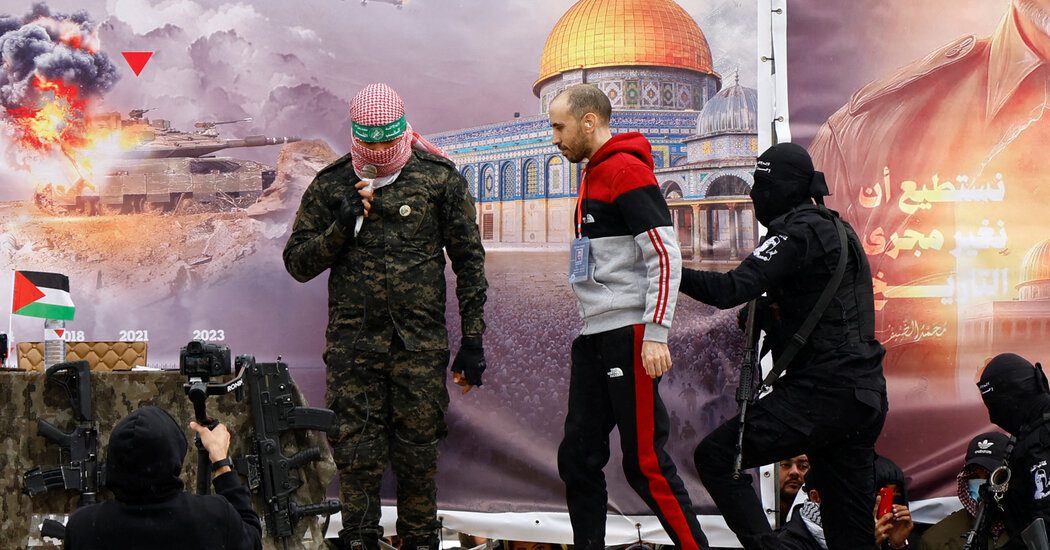
Jonathan Dekel-Chen’s Emotional Journey: Joy Amidst Ongoing Grief
For Jonathan Dekel-Chen, this week has been an emotional rollercoaster, blending happiness and sorrow. He recently welcomed his son, Sagui, back home after his release over the weekend as part of a ceasefire agreement with Hamas. However, the painful memories of Sagui’s captivity, along with the suffering of those still held hostage, loom heavily on his heart.
“Today is filled with conflicting emotions,” Mr. Dekel-Chen expressed during an interview on Thursday.
On that day, he had visited his son in a hospital near Tel Aviv, right as Hamas returned coffins purportedly containing the remains of four neighbors from Kibbutz Nir Oz. This community suffered immensely, losing roughly a quarter of its 400 residents either to death or captivity during the October 7, 2023 attack.
Over 500 days have passed since the assault by Hamas, and around 60 hostages are still unaccounted for. “We must strengthen our efforts to ensure all hostages are brought back home,” emphasized Mr. Dekel-Chen. Among those coffins returned were the remains of the Bibas family: Ariel Bibas, just 4, and his baby brother Kfir, along with their mother Shiri. The Bibas family became emblematic of the hostage crisis after videos of their abduction circulated widely.
However, on Friday morning, the Israeli military confirmed that the remains in what was believed to be Shiri Bibas’s coffin did not match any recorded hostages’ identities. “This represents a serious breach,” stated the military.
Confirmations did come through for the remains of the children and Oded Lifshitz, who was 83 at the time of his death in captivity at the hands of Palestinian Islamic Jihad, as shared by Prime Minister Benjamin Netanyahu’s office.
Oded Lifshitz, a retired journalist, was captured alongside his wife, Yocheved Lifshitz, who was released soon after for what Hamas deemed humanitarian and medical reasons. She has recounted harrowing experiences and described abusive conditions faced by the hostages confined within Hamas’s underground networks, cautioning that many captives may not survive the appalling circumstances.
Before the outbreak of conflict, Mr. Lifshitz devoted his time to driving Gazans for medical care in Israel and was a founding member of a Peace Now chapter, an organization advocating for a two-state solution to the Israeli-Palestinian conflict. Mr. Dekel-Chen, a longtime friend, spoke highly of Mr. Lifshitz, calling him a man deeply committed to his principles.
During a rally in Tel Aviv’s Hostage Square on Thursday night, thousands paid tribute to Mr. Lifshitz and the enduring hostages. Participants aimed to press the Israeli government for the release of those that remain captive.
Speakers at the rally urged the Netanyahu administration to ensure the ceasefire does not collapse. The initial stage of the deal between Israel and Hamas commenced in January and is expected to conclude shortly. Ongoing negotiations for the subsequent phase have stalled, leaving the fates of many remaining captives uncertain.
This delicate truce facilitated the release of hostages in exchange for Palestinians incarcerated in Israeli prisons, but families of hostages harbor fears that further exchanges may not occur.
At the rally, Yael Adar shared her son’s tragic story: Tamir Adar was killed during the Kibbutz Nir Oz attack, and his remains have yet to be returned from Gaza. She recounted how when Tamir’s son learned of the bodies being returned, he asked if his father would be among them.
“We had to tell him no, not now. Asaf couldn’t grasp why there were stages,” she reflected.
Mr. Netanyahu’s office has announced that instead of three, six living hostages would be released on Saturday, alongside the return of additional remains next week. However, concerns among families are palpable.
Hamas’s failure to return Ms. Bibas’s remains raises doubts about the next phase of hostage releases and the progression of ceasefire negotiations.
If discussions for the second phase falter, approximately 60 hostages—some believed to be deceased—may remain trapped in Gaza, placing those still alive in even greater peril should hostilities resume.
A rally held on Monday marked the grim milestone of 500 days of captivity for the hostages in Gaza, with heartfelt speeches from relatives of the victims. Yeela David, sister of Evyatar David, who was abducted during the October 7 attack, stated, “Phase 2 is the last chance for countless lives. If this deal collapses, it will leave a permanent mark in our history.”
Released hostages stressed the urgency for further efforts to secure freedom for those still captive.
At the Hostage Square rally, Aviva Siegel shared her husband Keith’s harrowing experience, having been detained for nearly 500 days, with six months spent in isolation. He faced beatings, threats at gunpoint, and endured unimaginable suffering, described by Aviva as a “hell” no one should experience.
“I survived; Keith survived. But others may not,” she warned.
This sentiment echoed throughout the gathering, including from Iair Horn, 46, who was released alongside others in exchange for 369 Palestinian prisoners. Iair recorded a heartfelt plea for his brother, Eitan Horn, still held captive in Gaza, during the rally just days after returning.
“I was there; I lived through it,” he recounted. “The hostages don’t have time. They must be brought home now.”
Since his release, Iair has been met with questions about his needs, to which he responds, “I seek only one thing: Bring back my brother. Bring back my brother and all the hostages.”









